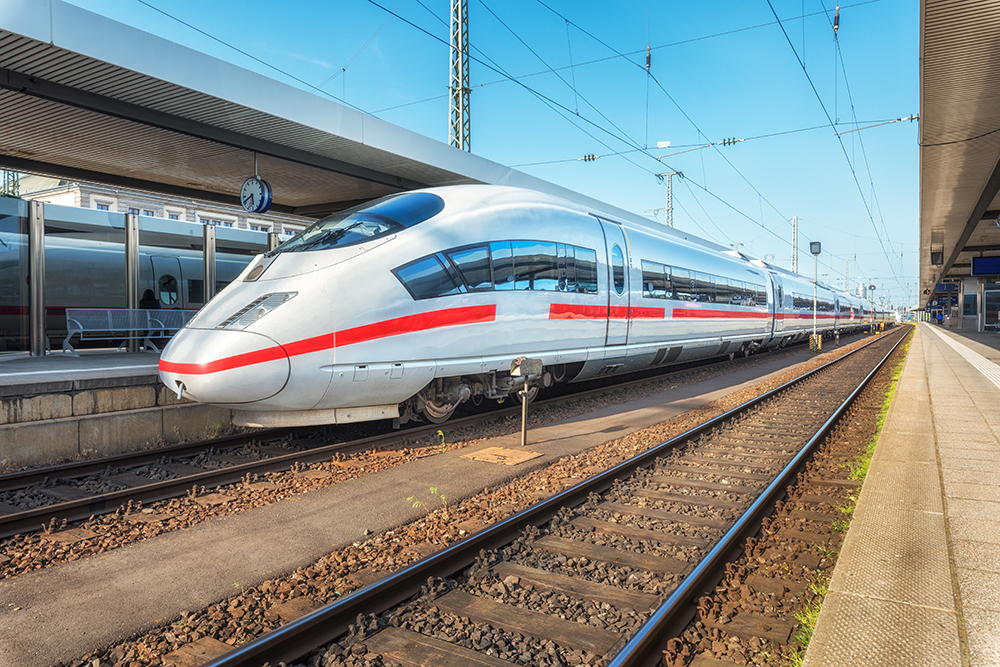Ah, you couldn’t make this stuff up, as we find ourselves saying on a daily basis.
Here’s a look at two ambitious infrastructure projects involving rail construction, separated by a few years and also by about everything else two projects could be separated on. One of the train stories dates way back to 2019; let me take you back to that era for all the readers less than five years old (not quite but close; last week I met a delightful family, a mother and two young daughters that are fascinated by pump jacks, love taking pictures of them, and are planning to launch an apparel line adorned by nodding donkeys. I’ll take five.) 2019 was the zenith of anti-hydrocarbon frenzy. It remains alive in small pockets of guilt-ridden billionaire inheritors and various political types that don’t understand energy and don’t want to learn, but 2019 was something else; hundreds of thousands of brainwashed children taking to the streets behind a strange Swedish kid that was treated like a messiah by confused adults. Canada’s prime minister jauntily joined one of her protests, standing proudly in front of signs explaining in emotional gobbledygook that the hydrocarbons that were keeping the sign-holders alive now and for the foreseeable future had to be eradicated immediately via some demand or magic or else the world will simply explode into flames a few decades hence.
Anyway, it was all surreal in one sense, but back to the railways: a few interesting milestones were hit around then that, when viewed alongside the climate hysteria of the era, prove without a doubt just how challenging it will be to transition to a new energy system.
But before getting to the 2019 story, we’ll check in on one that began long before then and continues to this day. It hails from sunny California, spiritual leader of the Movement To Use Extreme Wealth To Do Wacko Things. In 2008, voters approved a high-speed rail connection between Los Angeles and San Francisco, to be completed by 2020, at a cost of some $33 billion. Big numbers, both on the timescale and in the $ department. That’s reality these days though; nothing is easy or cheap, part of which is the price of going green. US energy transition advocates have reliably pointed out that high speed rail was a necessity all over the US, and the world for that matter. Nature website ran an article stating “…the role of high-speed railways in fostering a transition towards sustainable energy sources has gained prominence… these findings highlight the environmentally friendly attributes of high-speed railways and underscore the pressing need for effective policy measures to facilitate a global transition towards renewable energy, both in China and worldwide.”
A few interesting tidbits emerge out of this scenario. The first and most peculiar is that a scientific article on the scientific website Nature would assert that high-speed rail is important in “fostering a transition towards sustainable energy sources” – the statement has no logical basis, it flows from nothing, and is incoherent. HSR is wonderful, and makes efficient use of time, and possibly could replace air travel in some circumstances, and, as the paper rightly asks, HSR may well contribute to ‘nationwide energy savings and emissions reductions’. But none of these virtues foster a transition towards sustainable energy sources and to state it does is an oddly dumb non sequitur to feature as the anchor statement for an academic paper.
But anyways, whatever, the paper analyzes China’s experiences with HSR, which brings up a far more interesting point about the energy transition that is in the realm of That Which Must Not Be Discussed: the fact that in the west, major infrastructure projects are incredibly difficult to construct, whether green or not, and that initial cost estimates often turn out to be laughably low.
California did indeed set out to build an HSR in 2008, to be completed (as you may recall) some twelve years hence. But, as this California news website notes, “the blueprint is fraying”, which is some beautiful understatement. In 2020, the year the project was to be completed, Governor Newsom unveiled an updated plan, that California would settle for building a 171 mile initial segment – about a third of the distance of the original – at a cost of $35 billion, a number that exceeds the initial estimate for the entire 500 mile line. And the in-service date for the shortened version is now penciled in as 2030. As for an end date for the entire project, they haven’t a clue, don’t even bother taking a guess at it, but they have bravely provided an updated budget of, brace yourself, $128 billion. That’s almost four times the original estimate.
And even that number is scoffed at by engineers that have worked on HSRs. Bill Ibbs, a retired UC Berkeley engineer, says he is concerned about the lack of attention to engineering risks – that proponents don’t even address significant engineering challenges in the latest cost estimate, such as challenges likely to arise in the 38 miles of mountain tunnels required. (Per the article linked above: “Democratic leaders have declined or did not respond to requests for interviews.” Who saw that coming.)
That is what we are in store for in the western world. Keep this example in mind the next time you hear about net-zero 2050 visions based on almost any large scale infrastructure construction. You would have to be the world’s most naïve person to believe initial cost and time estimates.
Now, on the other hand, countries such as China have indeed made great progress though, as we’ll see in a second, the choice of China as an example is fairly ironic. The Nature academic paper notes that hundreds of Chinese cities already operate HSR networks. China has stunned the world with the pace at which it has developed infrastructure over the past 40 years; however, it is an authoritarian state that sweeps aside the sort of issues that bog down western democracies like a bear sweeps aside a hiker.
And if we’re going to marvel at the speed at which China has constructed these HSRs, then we should look at this one too. In 2019, China opened a brand new, 1,813 mile railroad, completed on schedule at a cost of $28 billion. It took 4 years to construct, and faced multiple significant challenges such as “crossing both the Yangtze and Yellow Rivers twice” and includes 770 bridges and 229 tunnels totalling 469 kilometres or 291 miles, some 8 times as many tunnel miles as California. This new rail line is dedicated to carrying… coal. It was created for no other reason. It was built entirely to handle coal.
That’s how they do it folks. An authoritarian state that removes any obstacles instantly, all to build a supply line for a fuel that the west is cleansing itself from as fast as it can. China realizes what it takes to build things. The West does not. Further, while China is the largest installer of renewable energy, it is fairly transparent about its appetite for any fuel. That’s how the world works, folks, except for some…
“How do you sleep at night?” Or… how to win a debate with extremist loons – hand them a microphone.
An NDP committee that hates things dragged a bunch of “Big Oil” (or “Big Canadian Oil”, anyway) CEOs onto the carpet to, literally, blame them for forest fires and floods. Their argument went about where you’d think it would, when your philosophical underpinnings are of that grade: Not only do you mooks create a lot of bad weather, but you line your pockets by doing so, gleefully so, and thus we want to know just how you can sleep at night.
The CEOs responded decently enough in their polished way, but I think it’s important when addressing an interrogation of that sort to firmly call out the lay of the land.
Rich Kruger, CEO of Suncor, said “I could praise the transformational virtues of hydrocarbons over the past century, convey the world’s dependence on oil and gas for decades to come, recite economic contributions to Canada’s prosperity and, yes, discuss the concerning effects of climate change and GHG emissions… however, today, I plan to dispel a series to myths. And paint a picture of opportunity.” The myths: oil & gas prosperity comes at the expense of the planet; Canadian companies are resisting the energy transition/decarbonization; and that Canada can demonstrate global leadership by restricting its oil & gas sector.
He’s not wrong, but there’s a significant subtlety that gets swept under the rug here, one that can cause grave danger to a lot of people.
First, y’all need to understand the battlefield. Kruger is right; it is to generate headlines, but consider the headlines carefully when selecting which myths to bust. They (the NDP) are literally accusing the hydrocarbon industry of murder – not with a gun, but via creating the emissions that cause weather disasters that kill people. They and their fellow warriors have created a lazy but sellable chain of causality there.
Mythbusting is important, but first, it is critical to take aim at the cornerstones of their argument, and not capitulate on those. In other words:
- If someone accuses you of killing a bunch of people, might I suggest that saying “Yeah, well, we pay a lot of taxes…” is a losing strategy?
- If someone accuses you of killing a bunch of people, might I suggest that saying “Don’t worry, I’m taking measures to mitigate how many people I kill.” is also a losing strategy?
- Absolutely speak of emissions reduction improvements and any efforts made towards an energy transition – but don’t ignore the emotional point they use, when it undercuts everything else you say.
They are accusing you of murdering people by producing fuel the world requires for survival. It’s silly; they (the NDP) have things precisely backwards – they are confused by the role of hydrocarbons in our life. So you need to address that first and foremost, because they are writing policy based on such faulty reasoning.
They are NOT asking you to produce your product better. They are saying you are killing the planet and its people and making a fortune while doing so.
Their army of lawyers, with literally nothing better to do (hello, Sierra Club/Environmental Defense/EcoJustice/ad infinitum) are running circles around your lawyers. You are facing an army of extremely well-funded legal guerillas. You need to recognize their weapons. You are fighting against rifles with a diorama of your decarbonization efforts.
Here is the answer that addresses the inanity of the question in a simple and fool-proof way, which will do the trick, because they will have no answer: Hydrocarbon production enables life as we know it. Without hydrocarbon production, most of the earth’s 8 billion people will not survive a year. Hydrocarbon production feeds those people in a way that nothing else can. Hydrocarbon production keeps countless people from freezing to death, every year, like nothing else at present can. Hydrocarbon production provides the building blocks for our modern medical system, our transportation system, and almost any other thing within arm’s length.
Hydrocarbon production enables life, and it will do so for decades until a suitable replacement arrives on the scene that can not just match, but beat hydrocarbons for energy density, reliability, and cost. That will most likely happen some day. But to attempt to strangle today’s fuel system without a replacement is a clearer path to willfully causing human death than is the production of the fuel that keeps us alive.
There are multiple excellent pathways a hydrocarbon company can go down to show the public they are validly concerned about the environment, such as eliminating spills, eliminating pollution of all sorts, or respecting and revitalizing natural habitats.
But when you tell them how eagerly you are ‘decarbonizing’, you forfeit the match. Your product is carbon. That is literally the murder weapon they place in your hands.
The impact on humanity from more carbon in the air, whatever the consequences may be, pales in comparison – by an astounding degree – to what the impact on humanity would be if oil and gas production were to cease.
Mr. Kruger touched on the most important part, but then skipped right over it: the “transformational virtues of hydrocarbons over the past century”, as a phrase, skips right over the entire arc of the human benefits brought through the industrial revolution, treating them as secondary aspect that needs to take a back seat to convincing the world that Canadian companies really are trying to decarbonize.
And let’s be clear about that whole idea: anyone that places decarbonization as the number one priority should drop whatever they’re doing to get out and make nuclear energy happen here, there, and everywhere, because that’s the only game in town as far as a global, achievable solution goes. I don’t have a problem with that. I love cheap, clean energy, available reliably and in abundance. And almost every global citizen would agree with those four, but more importantly would prefer all four, of those characteristics. People don’t love oil & gas. They love what it can do. Want to replace them? Then it has to be better in every functional way.
While the fate of oil/gas on the global stage will be determined by billions who know how much they need it, the emotional messaging of the NDP et al nevertheless has the power to shape legislation, for example to sneakily introduce climate reporting requirements into financial statements and thereby open the door to countless lawsuits – lawsuits which the industry will be forced to defend. And those singular-function activist-lawyers will eat you alive if you are sitting at the table agreeing about the need to rapidly decarbonize.
The messaging should be that humanity requires oil and gas and will for decades, and that role of industry is to do this as cleanly and efficiently as possible. That might sound like a subtle distinction compared to a pledge to decarbonize asap, but it’s not – it’s the difference between a bullet missing you by an inch and not.
The reason you need to think this way is because hydrocarbons will remain standing for a very long time as a fundamental source of energy, as is witnessed by the sheer global force of increasing consumption of every type of energy (see: New Zealand completely backtracking on an oil & gas exploration ban once it dawned on them that existing fields deplete – coming soon to governments everywhere)… But Western energy leaders may get seriously wounded by the sheer legal might of the enemies faced at such panels, and by the minions they inspire, as bombastically comical as it might appear on the surface.
Terry Etam is a columnist with the BOE Report, a leading energy industry newsletter based in Calgary. He is the author of The End of Fossil Fuel Insanity. You can watch his Policy on the Frontier session from May 5, 2022 here.



